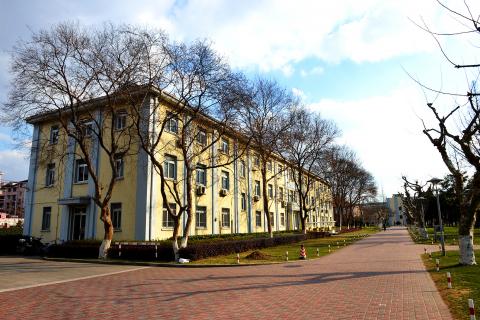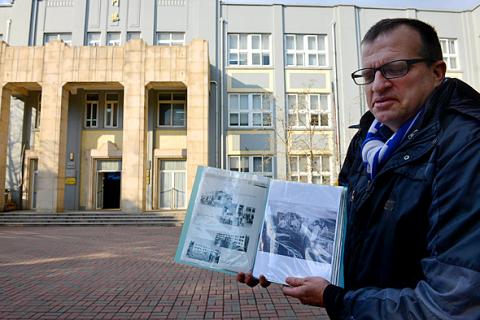No public memorial marks the former Shanghai internment camp made famous by JG Ballard’s novel Empire of the Sun, where more than 1,800 foreigners were held by the Japanese during World War II.
Ballard’s fictionalized version of his experiences in the Lunghwa camp was published 30 years ago, followed in 1987 by the Steven Spielberg film starring a young Christian Bale as Jim Graham, a boy who comes of age on his own in the facility.
The site is now an elite government-run school in Shanghai’s southern suburbs, where Chinese students are unaware internees once slept in their grey classroom buildings.

Photo: AFP
The only reminder is a small, easily-ignored display in a private campus museum.
“When I studied here, I was not aware of this part of history. It was not mentioned in class,” said Shanghai High School graduate Lucy Zhang.
The Chinese government, embroiled in a territorial dispute with Tokyo, regularly publicizes Japanese atrocities against its people from the 1930s to the end of World War II.

Photo: AFP
A far smaller number of foreigners lived in China at the time, but their sufferings have gone largely ignored.
An American teacher at the school, Sven Serrano, is trying to change that, lecturing on the history of the camp to foreign students in the school’s international section, showing visitors around and developing an online app about the site.
The school demolished the former G Block, where Ballard lived with his family, to make space for a swimming pool, but eight other buildings still stand, including the dining hall and assembly center, Serrano said.
“I’m always concerned that I’ll wake up one morning and the wrecking ball has been taken to one of our precious old buildings,” he told AFP.
“I don’t see any way how we’re going to have any memorial plaque. They just don’t want to make a really big deal of it,” he said — adding one reason for the sensitivity was Japanese students attending the school.
Former internee Betty Barr entered the Lunghwa camp in 1943 at the age of 10 with her Scottish missionary father, American mother and older brother.
Her most vivid memories are blistering summers, freezing winters and an obsession with food.
“I was old enough to know what was happening. I didn’t think it was a picnic,” said Barr, 80, during a return visit.
She still guiltily recalls taking a sip of milk produced by the camp’s only cow from a mug she was taking to her brother in the hospital.
“My father rose to be the manager of the kitchen, though he could not boil an egg, because he could be trusted not to steal vegetables,” she said.
A TIME TO REMEMBER
Japan set up more than 20 internment camps holding around 14,000 people in China and Hong Kong, then a British colony, according to Greg Leck, author of Captives of Empire about the Japanese internment of Allied civilians from 1941 to 1945.
Shanghai, an international commercial city where overseas citizens enjoyed legal privileges and comfortable lifestyles in foreign “concessions,” had 12 camps.
“Hunger and malnutrition, more than anything else, made conditions more severe,” he said. “Medical service personnel were confronted with every type of ailment … aggravated by lack of clothing, poor housing, poor sanitation, over-crowding and the stresses associated with captivity.”
On a vastly larger scale, Japan held both civilians and prisoners of war in 176 camps in its own country and 500 in occupied territories during the war. Japan was also responsible for the deaths of as many as 30 million Asians, including Chinese, his research showed.
Many former China internees have taken issue with Empire of the Sun over factual inaccuracies, uncomplimentary portrayals of recognizable people and the feeling that Ballard appropriated a story belonging to them.
“What upset many former inmates was that his hero, Jim, admired the Japanese,” said Barr, who knew Ballard. “I didn’t mind that but felt that some of what he wrote was not related to the reality. The film was even further removed.”
Ballard, who died in 2009, said his best-known novel was based on memories.
“Some of the events that I described are imaginary, but ... Empire of the Sun is a novel that is firmly based on true experiences, either my own or those told to me by other internees,” he wrote in his autobiography Miracles of Life.
The novel came out 40 years after the events it depicted, but the writer explained: “It took me 20 years to forget Shanghai and 20 years to remember.”

Most heroes are remembered for the battles they fought. Taiwan’s Black Bat Squadron is remembered for flying into Chinese airspace 838 times between 1953 and 1967, and for the 148 men whose sacrifice bought the intelligence that kept Taiwan secure. Two-thirds of the squadron died carrying out missions most people wouldn’t learn about for another 40 years. The squadron lost 15 aircraft and 148 crew members over those 14 years, making it the deadliest unit in Taiwan’s military history by casualty rate. They flew at night, often at low altitudes, straight into some of the most heavily defended airspace in Asia.

Many people in Taiwan first learned about universal basic income (UBI) — the idea that the government should provide regular, no-strings-attached payments to each citizen — in 2019. While seeking the Democratic nomination for the 2020 US presidential election, Andrew Yang, a politician of Taiwanese descent, said that, if elected, he’d institute a UBI of US$1,000 per month to “get the economic boot off of people’s throats, allowing them to lift their heads up, breathe, and get excited for the future.” His campaign petered out, but the concept of UBI hasn’t gone away. Throughout the industrialized world, there are fears that

Like much in the world today, theater has experienced major disruptions over the six years since COVID-19. The pandemic, the war in Ukraine and social media have created a new normal of geopolitical and information uncertainty, and the performing arts are not immune to these effects. “Ten years ago people wanted to come to the theater to engage with important issues, but now the Internet allows them to engage with those issues powerfully and immediately,” said Faith Tan, programming director of the Esplanade in Singapore, speaking last week in Japan. “One reaction to unpredictability has been a renewed emphasis on

Taiwan’s democracy is at risk. Be very alarmed. This is not a drill. The current constitutional crisis progressed slowly, then suddenly. Political tensions, partisan hostility and emotions are all running high right when cool heads and calm negotiation are most needed. Oxford defines brinkmanship as: “The art or practice of pursuing a dangerous policy to the limits of safety before stopping, especially in politics.” It says the term comes from a quote from a 1956 Cold War interview with then-American Secretary of State John Foster Dulles, when he said: ‘The ability to get to the verge without getting into the war is